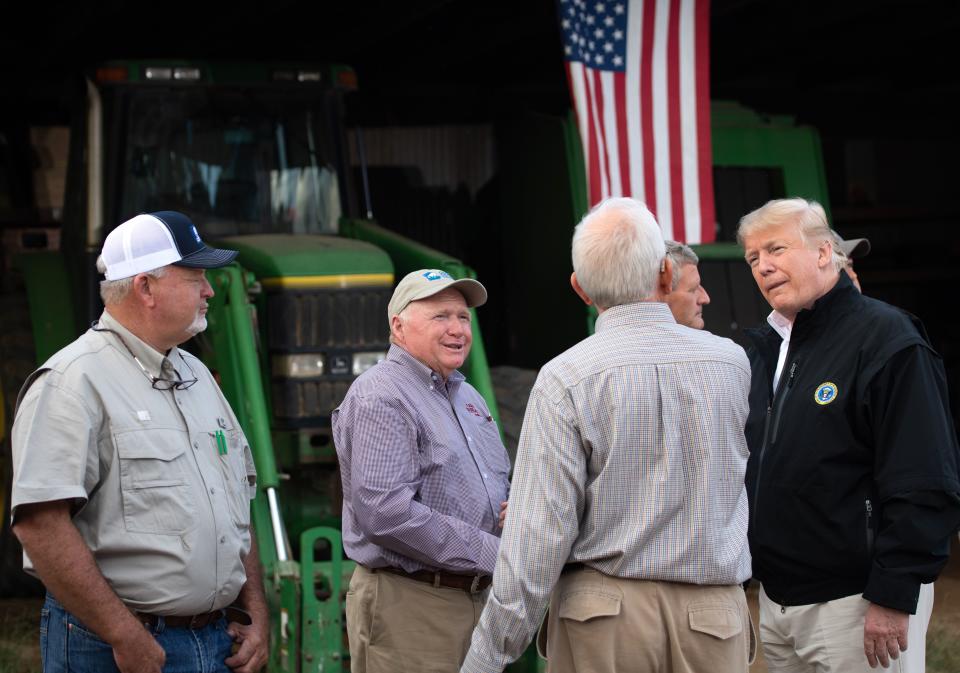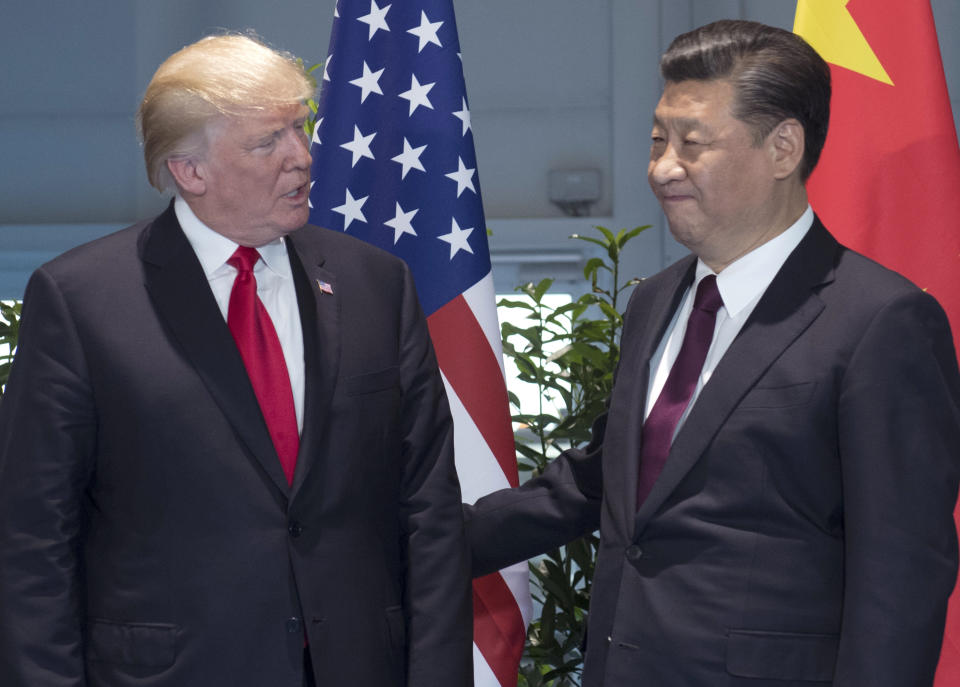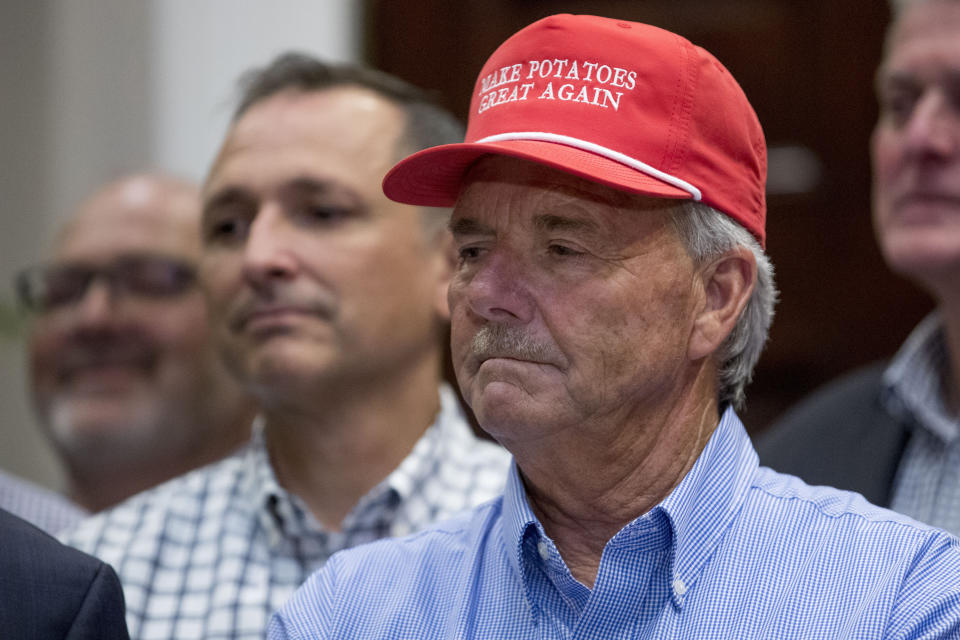Farmers ‘cautiously optimistic’ after U.S.-China trade deal
Farmers were relieved to hear over the weekend that President Donald Trump reached the first phase of a trade deal with China, as the two countries have been feuding since March 2018. China agreed to purchases of $40 billion-$50 billion in U.S. agriculture goods.
But farmers are not letting their guard down just yet. Blake Hurst, president of the Missouri Farm Bureau and a soybean farmer, and Tim Bardole, president of the Iowa Soybean Association, each stressed to Yahoo Finance that they remain “cautiously optimistic.”
“The promise of $50 billion would be twice our highest year ever, so if that comes to fruition, then it’s a wonderful day for U.S. agriculture,” Hurst said. “The challenge we have is that we’ve been promised a lot of things throughout these negotiations and not all of them have come to fruition.”

This isn’t the first time the U.S. and China have appeared to reach a trade truce. In December 2018, the two countries were seemingly on good terms following the G20 Summit, and China resumed buying U.S. soybeans. However, tensions resumed after the U.S. increased its tariffs to 15% on $200 billion worth of Chinese goods.
“If they’re talking $40-$50 billion, that would be a huge boost to the ag economy,” Bardole said. “I’m a little skeptical whether it will ever reach that high, but if it comes to pass, it would definitely do a lot to heal some of the wounds that have financially happened here in the last 18 months.”
‘We haven’t heard any numbers out of China’
The issue at hand, Hurst explained, is that the promise of China buying U.S. agriculture goods has only been mentioned by the Trump administration.
“We haven’t heard any numbers out of China,” he said. “And that’s what we’ve got to hear. The market will anticipate the sales. Even if they’re several months in the future, we’ll start seeing better prices as soon as they think those sales are going to happen.”
The other problem is that China has not always been true to its word, often reneging on its promises.
“We get this new story that we’re going to have this great deal as we had back in the spring, and then the Chinese went home, and a week later, it went away,” Hurst said. “Then we didn’t have negotiations for several months, so once bitten, twice shy. We obviously have to wait and see.”
He continued: “China has a history of canceling purchases once they’ve been made. In other words, they’re already going to be loaded on a boat and headed east. And then the sale will be canceled for one reason or another. So we really have learned not to believe it until we see that, as the saying goes, ‘til the check hits the mailbox.’”

For Bardole, the priority in nailing down a trade deal is “free, fair trade” with China.
“China historically has done things to skew the market by making purchases and then cancelling those purchases, which makes the market crash,” he explained. “There’s been quite a few [other] trade things they’ve done to manipulate the market in their favor and in turn, that’s really hurt the U.S. farmers in the market and what we can get for our product.”
Iowa and Missouri, the states that Hurst and Bardole are based out of, are two of the states that export the most to China and have been hit hardest by the tit-for-tat tariffs. Missouri’s exports to China are down 19%, while Iowa’s exports are down a whopping 43% over the last year, according to the U.S.-China Business Council.
Until more details are made public, farmers are in “wait and see” mode as they try to maintain financial stability.
“What we plant will be different depending on whether this trade bill is put in place or not,” Hurst said. “We really need some certainty before we make our plants for next year.”
Happy, but skeptical

Despite all of these hiccups, American farmers are remaining relatively loyal to President Trump and the administration.
“President Trump is dealing with the problem that maybe the average American doesn’t even realize was there, that there has been some serious issues [with China],” Bardole said. “As a farmer, I just want him to get a good deal and to not go back to status quo, because there was some serious issues the way it had been. I think that farmers are happy to hear that we’re hopefully getting closer to a resolution of the trade dispute, as time will tell.”
Hurst agreed, adding that his contacts, along with what he calls “ag Twitter,” have made it clear that “people are very excited about the opportunity” created from the deal.
“It would be a huge market for us,” he said. “But we’re Missourians. That’s why we say we’re the Show Me state. At this point, we’re going to have to see a little bit more concrete proof of an actual deal before we get very excited.”
Adriana is an associate editor for Yahoo Finance. Follow her on Twitter @adrianambells.
READ MORE:
There's a much bigger issue playing out in the background of the U.S.-China trade war
Buttigieg on Trump’s trade war: This is bigger than ‘who’s selling more dishwashers’
Trade war damage is 'more significant than most Americans ever realized'
Read the latest financial and business news from Yahoo Finance
Follow Yahoo Finance on Twitter, Facebook, Instagram, Flipboard, SmartNews, LinkedIn, YouTube, and reddit.

